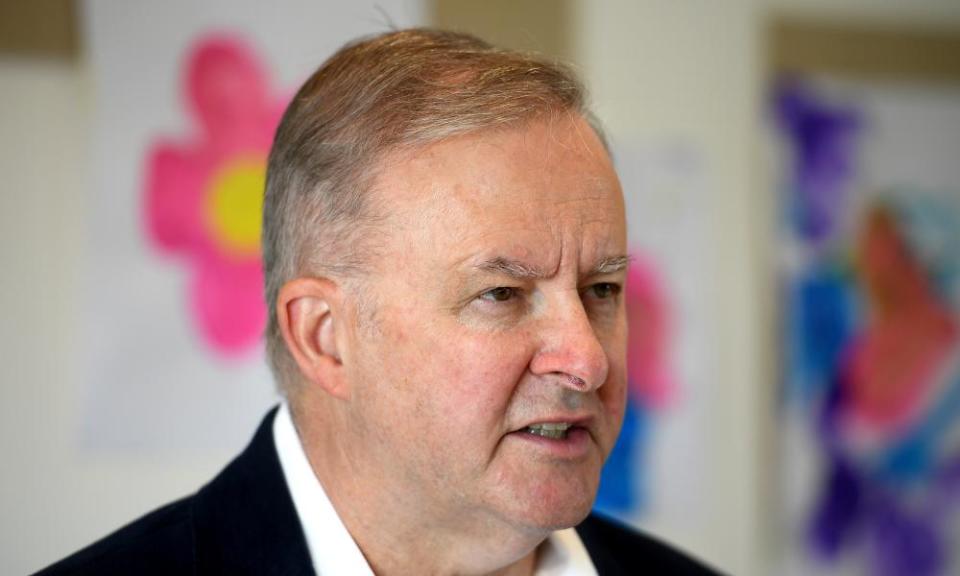Anthony Albanese signals possible return to Labor's 2019 workplace policies

Anthony Albanese has signalled Labor will take improved workplace bargaining policies to the next election to boost wages but will defer a 2035 emissions reduction target until the Coalition shows its hand.
On Sunday the Labor leader promised to “change the industrial relations system so there can be proper bargaining”, raising the prospect that its 2019 policies, including multi-employer bargaining, could be about to make a comeback.
In an interview with Sky News, Albanese also signalled Labor is open to lifting the superannuation rate to 15% and attacked the Coalition for its plans to allow employers affected by Covid-19 to seek to cut penalty rates.
Related: Coalition lays groundwork for advertising campaign to spruik workplace relations overhaul
Despite remaining competitive with the government in polls, Albanese starts 2021 facing internal critics from the right-faction, including Joel Fitzgibbon, who want him to agree to the Coalition’s emission reduction targets, and general concerns he must sharpen his attack on the Morrison government.
Albanese told Sky News he made “no apology” for his approach during the pandemic to put national interest ahead of party political interests.
He said that despite concerns with some Coalition measures, like early access to super, Labor supported government stimulus packages and had provided “constructive suggestions” such as wage subsidies, a focus on mental health, and ongoing calls for more quarantine capacity to help Australians stranded overseas.
Asked whether Labor would propose a medium-term emissions reduction target – which he has at times committed to and at times side-stepped – Albanese cryptically replied “there again, a lot will happen this year”.
Albanese said Labor endorsed net zero emissions by 2050 and “we need targets that are consistent with achieving that”.
But he argued that Labor needed “one policy, not a policy in 2019 which then changes in 2020, which changes in 2021” and international commitments were not yet settled.
Albanese noted the Glasgow climate conference in November and that the Paris agreement requires a new target beyond Australia’s 26-28% reduction by 2030 “which they’re not going to meet”.
“I would expect that, in the lead-up to Glasgow, we mightn’t be talking about the government having a 2030 target, we might be talking about the government having a 2035 target, because that’s what Paris allows for, a continual change in terms of that being set.”
Albanese predicted that Scott Morrison would adopt the net zero target because it would be “absurd” not to, as Australia is “isolated” without it.
“Every one of our major trading partners has net zero by 2050, except for China, which is net zero by 2060, which is a pretty strong target given where their projections are, and it will require massive action by China.”
Albanese accused the Coalition of failing to make jobs more secure and to increase wages, noting wage growth has “never been as stagnant since records began in Australia”.
He promised “we will have other policies to boost productivity across the board, including on industrial relations”.
Before the 2019 election, Labor announced it would legislate so that employees of labour hire firms are paid the same as workers in the businesses where they are placed and allow multi-employer bargaining to prevent companies cutting wages by outsourcing jobs.
Related: Government's super changes a 'gift' to for-profit sector, industry funds claim
Albanese promised Labor would ensure “proper bargaining, so that there can be good outcomes”. He accused the government of proposing legislation that would allow employers to cut penalty rates and of preparing to abandon legislated rises in the superannuation guarantee from 9.5% to 12%.
Albanese argued employers could afford super rises which have “been legislated for a long period of time” and rise gradually, starting with just 0.5% on 1 July.
On revenue raising measures, Albanese noted Labor has already ditched plans to end franking credit rebates for people who pay no net tax, but would not say how it would handle negative gearing.
On Sunday, the former Labor leader Bill Shorten, who made gains at the 2016 election only to lose a second straight poll in the shock Coalition win of 2019, will add to angst about Albanese’s leadership by arguing Labor must not be too small a target.
In a speech to be delivered at a Labor-right faction book launch, Shorten will say he has “learnt the lessons of defeat and I have learnt, and the party has learnt, the dangers of taking too large or too cluttered a policy agenda to the electorate”.
“But the polar opposite of a tiny agenda is not the right way either,” he says. “We must be an opposition that stands for something. We must be a party of Labor that stands for the real world concerns of working men and women.”

 Yahoo Finance
Yahoo Finance 